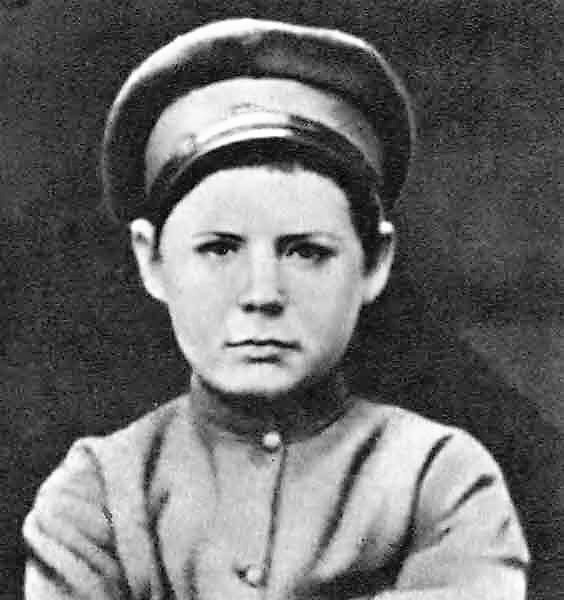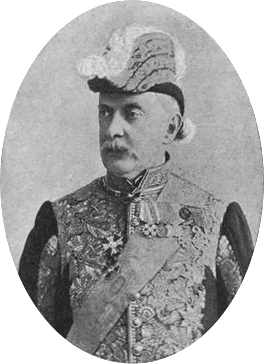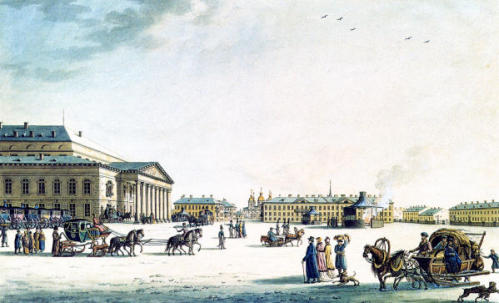|
Mariinsky Theatre
The Mariinsky Theatre (, also transcribed as Maryinsky or Mariyinsky) is a historic opera house in Saint Petersburg, Russia. Opened in 1860, it became the preeminent music theatre of late 19th-century Russia, where many of the stage masterpieces of Tchaikovsky, Mussorgsky, and Rimsky-Korsakov received their premieres. Through most of the Soviet era, it was known as the Kirov Theatre. Today, the Mariinsky Theatre is home to the Mariinsky Ballet, Mariinsky Opera and Mariinsky Theatre Orchestra, Mariinsky Orchestra. Since Yuri Temirkanov's retirement in 1988, the conductor Valery Gergiev has served as the theatre's general director. Name The theatre is named after Maria Alexandrovna (Marie of Hesse), Empress Maria Alexandrovna, wife of Alexander II of Russia, Tsar Alexander II. There is a bust of the Empress in the main entrance foyer. The theatre's name has changed throughout its history, reflecting the political climate of the time: * 1860 – 1920: Imperial Mariinsky Theatre () ... [...More Info...] [...Related Items...] OR: [Wikipedia] [Google] [Baidu] |
Mariinsky Curtain
Mariinsky (masculine), Mariinskaya (feminine), or Mariinskoye (neuter) may refer to: Mariinsky Theatre *Mariinsky Theatre in St. Petersburg, Russia, and the ensembles headquartered there: **Mariinsky Ballet **Mariinsky Opera **Mariinsky Orchestra **Mariinsky Academy of Young Singers; see soloist Eleonora Vindau *its concert hall, the Mariinsky_Theatre#Mariinsky Theatre Concert Hall, Mariinsky Theatre Concert Hall *its second stage, the Mariinsky Theatre Second Stage, Mariinsky-2 Other *Mariinsky, Republic of Bashkortostan, a ''selo'' in Otradovsky Selsoviet of Sterlitamaksky District, Republic of Bashkortostan *Mariinsky District, a district of Kemerovo Oblast, Russia *Mariinsky Hospital, a hospital in Meshchansky District, Moscow, Russia *Mariinsky Palace, a neoclassical imperial palace in St. Petersburg, Russia *Mariinskoye Urban Settlement, a municipal formation within the Mariinsky Municipal District See also *Mariinsko-Posadsky (other) *Mariinsky Pos ... [...More Info...] [...Related Items...] OR: [Wikipedia] [Google] [Baidu] |
Saint Petersburg
Saint Petersburg, formerly known as Petrograd and later Leningrad, is the List of cities and towns in Russia by population, second-largest city in Russia after Moscow. It is situated on the Neva, River Neva, at the head of the Gulf of Finland on the Baltic Sea. The city had a population of 5,601,911 residents as of 2021, with more than 6.4 million people living in the Saint Petersburg metropolitan area, metropolitan area. Saint Petersburg is the List of European cities by population within city limits, fourth-most populous city in Europe, the List of cities and towns around the Baltic Sea, most populous city on the Baltic Sea, and the world's List of northernmost items#Cities and settlements, northernmost city of more than 1 million residents. As the former capital of the Russian Empire, and a Ports of the Baltic Sea, historically strategic port, it is governed as a Federal cities of Russia, federal city. The city was founded by Tsar Peter the Great on 27 May 1703 on the s ... [...More Info...] [...Related Items...] OR: [Wikipedia] [Google] [Baidu] |
Sergey Kirov
Sergei Mironovich Kirov (born Kostrikov; 27 March 1886 – 1 December 1934) was a Russian and Soviet politician and Bolshevik revolutionary. Kirov was an early revolutionary in the Russian Empire and a member of the Bolshevik faction of the Russian Social Democratic Labour Party. Kirov became an Old Bolshevik and personal friend to Joseph Stalin, rising through the Communist Party of the Soviet Union ranks to become head of the party in Leningrad and a member of the Politburo. On 1 December 1934, Kirov was shot and killed by Leonid Nikolaev at his offices in the Smolny Institute. Nikolaev and several alleged accomplices were convicted in a show trial and executed less than 30 days later. Kirov's assassination was used by Stalin as a reason for starting the Moscow trials and the Great Purge. Early life Sergei Mironovich Kostrikov was born on in Urzhum in Vyatka Governorate, Russian Empire, as one of seven children born to Miron Ivanovich Kostrikov and Yekaterina Kuzmini ... [...More Info...] [...Related Items...] OR: [Wikipedia] [Google] [Baidu] |
Imperial Opera
Imperial is that which relates to an empire, emperor/empress, or imperialism. Imperial or The Imperial may also refer to: Places United States * Imperial, California * Imperial, Missouri * Imperial, Nebraska * Imperial, Pennsylvania * Imperial, Texas * Imperial, West Virginia * Imperial, Virginia * Imperial County, California * Imperial Valley, California * Imperial Beach, California Elsewhere * Imperial (Madrid), an administrative neighborhood in Spain * Imperial, Saskatchewan, a town in Canada Buildings * Imperial Apartments, a building in Brooklyn, New York * Imperial City, Huế, a palace in Huế, Vietnam * Imperial Palace (other) * Imperial Towers, a group of lighthouses on Lake Huron, Canada * The Imperial (Mumbai), a skyscraper apartment complex in India * Imperial War Museum, a British military museum and organisation based in London, UK * * Imperial War Museum Duxford, an aviation museum in Cambridgeshire, UK * * Imperial War Museum North, a milita ... [...More Info...] [...Related Items...] OR: [Wikipedia] [Google] [Baidu] |
Ivan Vsevolozhsky
Ivan Alexandrovich Vsevolozhsky (; 1835–1909) was the Director of the Imperial Theatres in Russia from 1881 to 1898 and director of the Hermitage from 1899 to his death in 1909. Vsevolozhsky ran the Imperial Theatres with a determination for excellence. In 1886, Vsevolozhsky initiated two major reforms for the St. Petersburg Imperial Theatres, namely the relocation of the Imperial Ballet and Opera from the Bolshoi Kamenny Theatre (deemed unsafe by 1886) to the Mariinsky Theatre, and the abolition of the post of ''First Imperial Ballet Composer'', a post previously held by such composers as Léon Minkus and Cesare Pugni. Alexandre Benois and Roland John Wiley credit him with the revival of ballet as a serious art form in Russia.Wiley, p. 94. Early life The Vsevolozhsky family was descended from the Rostislavichi of Smolensk. He graduated from the University of St Petersburg before working in the Asian section of the Department of International Affairs, the Rus ... [...More Info...] [...Related Items...] OR: [Wikipedia] [Google] [Baidu] |
Pyotr Ilyich Tchaikovsky
Pyotr Ilyich Tchaikovsky ( ; 7 May 1840 – 6 November 1893) was a Russian composer during the Romantic period. He was the first Russian composer whose music made a lasting impression internationally. Tchaikovsky wrote some of the most popular concert and theatrical music in the classical repertoire, including the ballets '' Swan Lake'' and ''The Nutcracker'', the '' 1812 Overture'', his First Piano Concerto, Violin Concerto, the ''Romeo and Juliet'' Overture-Fantasy, several symphonies, and the opera ''Eugene Onegin''. Although musically precocious, Tchaikovsky was educated for a career as a civil servant as there was little opportunity for a musical career in Russia at the time and no public music education system. When an opportunity for such an education arose, he entered the nascent Saint Petersburg Conservatory, from which he graduated in 1865. The formal Western-oriented teaching Tchaikovsky received there set him apart from composers of the contemporary nationalist ... [...More Info...] [...Related Items...] OR: [Wikipedia] [Google] [Baidu] |
Modest Mussorgsky
Modest Petrovich Mussorgsky (; ; ; – ) was a Russian composer, one of the group known as "The Five (composers), The Five." He was an innovator of Music of Russia, Russian music in the Romantic music, Romantic period and strove to achieve a uniquely Russian musical identity, often in deliberate defiance of the established conventions of Western music. Many of List of compositions by Modest Mussorgsky, Mussorgsky's works were inspired by Russian history, Russian folklore, and other national themes. Such works include the opera ''Boris Godunov (opera), Boris Godunov'', the orchestral tone poem ''Night on Bald Mountain'' and the piano suite ''Pictures at an Exhibition''. For many years, Mussorgsky's works were mainly known in versions revised or completed by other composers. Many of his most important compositions have posthumously come into their own in their original forms, and some of the original scores are now also available. Name The spelling and pronunciation of the c ... [...More Info...] [...Related Items...] OR: [Wikipedia] [Google] [Baidu] |
Mikhail Glinka
Mikhail Ivanovich Glinka ( rus, links=no, Михаил Иванович Глинка, Mikhail Ivanovich Glinka, mʲɪxɐˈil ɨˈvanəvʲɪdʑ ˈɡlʲinkə, Ru-Mikhail-Ivanovich-Glinka.ogg; ) was the first Russian composer to gain wide recognition within his own country and is often regarded as the fountainhead of Russian classical music. His compositions were an important influence on other Russian composers, notably the members of The Five, who produced a distinctive Russian style of music. Early life and education Glinka was born in the village of Novospasskoye, not far from the Desna River in the Smolensk Governorate of the Russian Empire (now in the Yelninsky District of the Smolensk Oblast). His wealthy father had retired as an army captain, and the family had a strong tradition of loyalty and service to the tsars, and several members of his extended family had lively cultural interests. His great-great-grandfather was a Polish–Lithuanian Commonwealth nobleman, Wikt ... [...More Info...] [...Related Items...] OR: [Wikipedia] [Google] [Baidu] |
Circus
A circus is a company of performers who put on diverse entertainment shows that may include clowns, acrobats, trained animals, trapeze acts, musicians, dancers, hoopers, tightrope walkers, jugglers, magicians, ventriloquists, and unicyclists as well as other object manipulation and stunt-oriented artists. The term "circus" also describes the field of performance, training, and community which has followed various formats through its 250-year modern history. Although not the inventor of the medium, Newcastle-under-Lyme born Philip Astley is credited as the father of the modern circus. In 1768, Astley, a skilled equestrian, began performing exhibitions of trick horse riding in an open field called Ha'penny Hatch on the south side of the Thames River, England. In 1770, he hired acrobats, tightrope walkers, jugglers, and a clown to fill in the pauses between the equestrian demonstrations and thus chanced on the format which was later named a "circus". Performances deve ... [...More Info...] [...Related Items...] OR: [Wikipedia] [Google] [Baidu] |
Catterino Cavos
Catterino Albertovich Cavos (; ; October 21, 1777 – ) was an Italian composer, organist and conductor who settled in Russia. He played an important role in the history of Russian opera and was the father of Alberto Cavos.Ardoin, John. (2001). "Valery Gergiev and the Kirov: A Story of Survival", pp. 10-11 Portland, OR: Amadeus Press. Cavos is celebrated in Russian musical history as the man who composed the opera ''Ivan Susanin'' in 1815, 20 years before Mikhail Glinka's opera of the same name.Taruskin, Richard (1996). "Stravinsky and the Russian Traditions: A Biography of the Works Through Mavra, Volume 1" p. 426 Oxford: Oxford University Press The plot, based on an episode from Russian history, tells the story of the Russian peasant and patriotic hero Ivan Susanin who sacrifices his life for the Tsar by leading astray a group of marauding Poles who were hunting him.Robert Leach and Victor Borovsky (1999) "Russian Opera by John Warrack" ''A History of the Russian Theatre.'' ... [...More Info...] [...Related Items...] OR: [Wikipedia] [Google] [Baidu] |
Albert Cavos
Alberto Katerinovich Cavos (; – ) was a Russian–Italian architect best known for his theatre designs, the builder of the Mariinsky Theatre in Saint Petersburg (1859–1860) and the Bolshoi Theatre in Moscow (1853–1856). Early years Alberto Cavos was born in Saint Petersburg to Venetian opera composer Catterino Cavos (see Cavos family), and his wife, Camilla Baglioni, who had settled in Russia in 1798, after the fall of the Republic of Venice. Alberto Cavos was educated in the University of Padua and then returned to Russia to complete practical training in Carlo Rossi's workshop. His brother Giovanni (Ivan, 1805–1861) was trained in music and assisted his father in Saint Petersburg opera. Bolshoi Theatre (Saint Petersburg) In 1826 Cavos received his first commission – rebuilding of the former Bolshoi Kamenny Theatre (the ''Stone Theatre''). Built by Antonio Rinaldi in 1770,Fitzlyon, p. 253 the theatre burnt down in 1811; restoration was interrupted by the death o ... [...More Info...] [...Related Items...] OR: [Wikipedia] [Google] [Baidu] |
Imperial Bolshoi Kamenny Theatre
The Saint Petersburg Imperial Bolshoi Kamenny Theatre (The Big Stone Theatre of Saint Petersburg, ) was a theatre in Saint Petersburg. It was built in 1783 to Antonio Rinaldi's Neoclassical design as the Kamenny (i.e., Stone) Theatre; Giovanni Paisiello’s opera ''Il mondo della luna'' was performed at the opening on 24 September. It was rebuilt in 1802 according to the designs of the architect Thomas de Thomon and renamed the Bolshoi, but burned down in 1811. The building was restored in 1818, and modified between 1826 and 1836 by Alberto Cavos to accommodate more modern machinery. Until 1886, the Bolshoi Kamenny Theatre was principal theatre for both the Imperial Ballet and the Imperial Russian Opera. In 1886 the building was declared unsafe and, at the behest of the theatre director Ivan Vsevolozhsky, the ballet and opera performances moved to the Imperial Mariinsky Theatre, where they have remained ever since. The Imperial Bolshoi Kamenny Theatre was then torn down ... [...More Info...] [...Related Items...] OR: [Wikipedia] [Google] [Baidu] |







